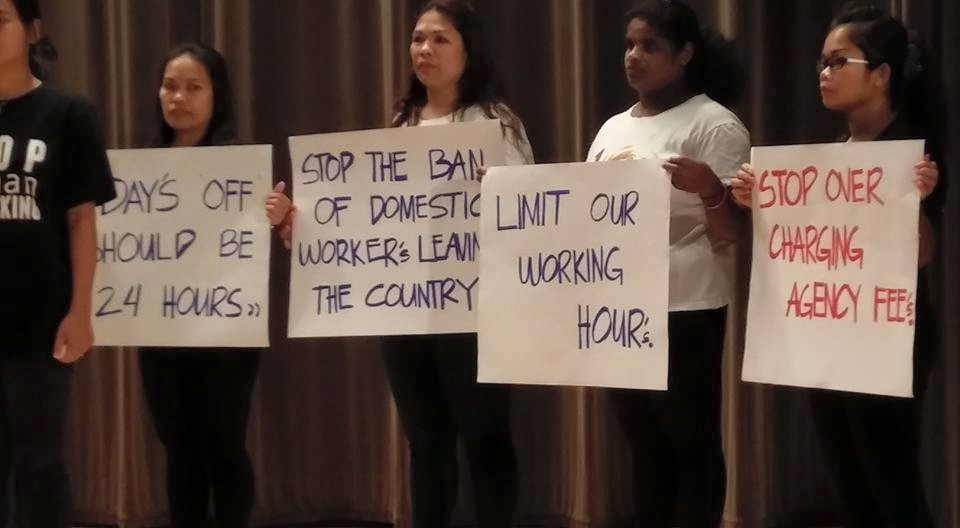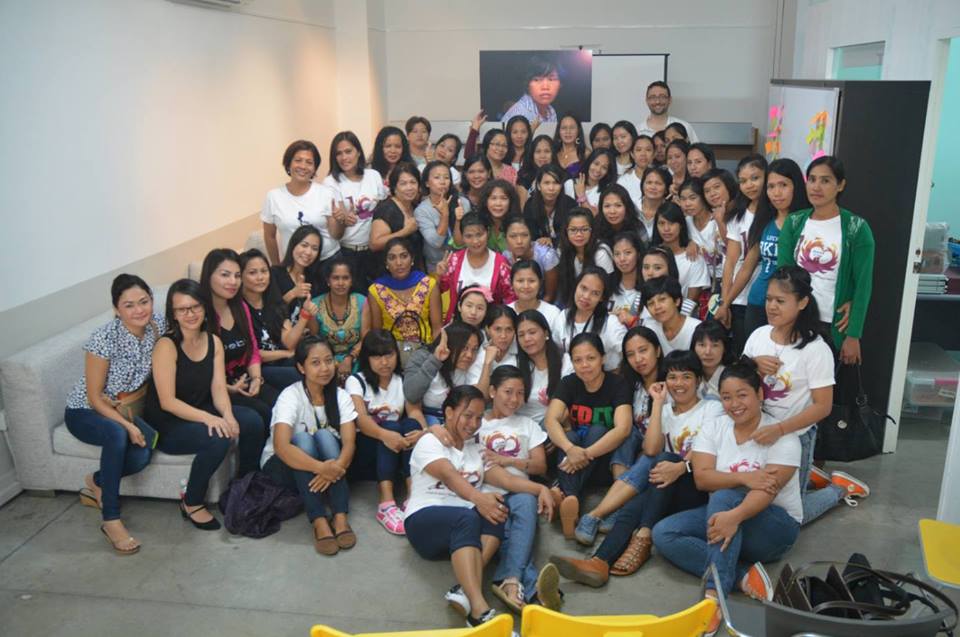移住労働者経済のための人権擁護組織 (The Humanitarian Organization for Migration Economics)、またはその頭文字を取り「ホーム(HOME)」と呼ばれているこの組織は、シンガポールに住む「声なき人たちに声を与える」ことを目標として、移住労働者が書いた話や記事や詩、あるいは写真を投稿できる 「マイ・ボイス」という名のウェブサイト [2] を提供している。支持団体は虐待を受けた労働者のサポートも行っている。
政府の統計データ [3]によると、シンガポールでは130万人の外国人労働者が登録されている。このうち20万人以上が家事労働に従事しており、主にフィリピン、インドネシア、ミャンマー、インドなど周辺国の出身だ。
近年、様々な報告により、雇用者による虐待を受けた家事労働者の被害実態 [4]が明らかになってきている。家事労働者の権利を保護 [5] する新しい法律が策定されたにもかかわらず、虐待の事例は増えている。2016年8月、シンガポールのニュースサイトは、国内に住む9千人以上の外国人労働者が奴隷のような状態で働き、生活しているというある 調査結果 [6] について報じた。
マイ・ボイスに投稿された話や詩の多くは胸が張り裂けるような体験談ばかりで、シンガポールではほとんど耳にすることも、報じられることもないものだ。ここで語られている物語は外国人家事労働者が置かれている苦境を浮き彫りにしている。そういった家事労働者のほとんどは、貧困にあえぐ家族をそれぞれの国に残し、より良い機会を求めてシンガポールへやってきた若い女性たちだ。
例えば、ミルナ・ハビエルさんは、外国で働いている母親を持つ子どもを思い浮かべて詩を書いた [7]。詩の抜粋はこうだ。
Father, where is my dearest Mama?
Tearfully ask the little one.
Papa can’t give her the right answer
That Mama went to seek for a job on a foreign land
To give us all the better life and free us all from all this strife.Suppressed happiness in exchange of a dime to a dollar.
Scarcity, of everything, shelter, food and tattered clothes
Simple yet happy filled with love and unity.Hush dear child, be patient and good.
Dear Mama will be home
Until then let’s smile at the sun and moon
She’ll be with us forever soon
お父さん 大好きなお母さんはどこ
小さなその子は涙声で聞いた
父は娘に本当のことは言えない
母は仕事を探しに外国に行ってしまった
みんなが豊かに暮らせるように すべての苦しみを終わらせるように10セントを1ドルにするために 幸せを犠牲にした
すべてが十分にない 住むところに食べ物 服もボロボロ
質素だったけど幸せ 愛にあふれて 家族が一緒にいられたいい子だから辛抱しよう
優しいお母さんは帰ってくるよ
それまでお日さまとお月さまに ほほえみを見せよう
もうすぐお母さんは帰ってくる そしてずっと一緒に暮らそう
ビン・ナバトさんの詩は、虐待を受け、ホームのような組織に助けを求めてきた多くの家事労働者の実体験を的確に伝えている [9]。
When I decided to leave my country,
The hardest part was leaving my family.
When I looked at my children, it broke my heart
My husband’s teary eyes tore me apart.I arrived here full of hope,
I prayed day by day so I could cope.
With three houses to clean in a week,
Rice and eggs for my meals, it really made me weak.My sleeping area was inadequate,
Although I had a mattress, a pillow and a blanket.
Beside the fish tank was my place to sleep.
Every night, I told the fish,
You’re lucky, you have a crib.I almost lost my temper one day
When she came to me with only harsh words to say.
I looked at her and thought this way:
The day will come when I will have my way.Finally it happened, I finished my contract,
Asked for a transfer, but she wanted to send me back.
I was surprised, it was really unfair
I worked so hard, she didn’t even care.So I decided to leave without permission,
Running away was my only option.
I went to HOME, they guided me all along,
They helped me in everything, taught me how to be strong.
故郷を去ると決めた時の思い
家族と離れることが一番辛い
子どもたちを見ると 悲しくてたまらない
夫の涙にくれた目は 心を締めつけてやりきれない私は希望に満ちてここへ降り立った
毎日毎日私は祈った 祈ってなんとか乗り切った
一週間にこなす三軒の掃除
心身ともに弱ってしまう 米と卵しかない食事マットレス 枕 毛布はあるものの
寝るのはまるで寝室とは呼べないところ
私の寝場所は水槽の傍ら
毎夜 話し相手は水槽の魚
あなたは運がいいわね 自分の部屋があるのだから雇い主が来て きつい言葉を浴びせたあの日
怒りで我を忘れそうになった
私は雇い主を見つめて思った こんなふうに
思い通りにできる日は来る もっと自由についにその日が来て 私の契約は終わった
別の仕事に移れるように頼んだけれど 雇い主は故郷へ帰らせると言った
不当な仕打ちに 言葉も出ない
懸命に働いた見返りは 冷酷無情な扱いだから許可も取らずに立ち去った
逃げること以外に道はなかった
私がホームへ逃げこむと みんなは私に寄り添って
強くなることを教えてくれた 何から何まで手伝って
虐待を受けた経験を持つインドネシア出身の家事労働者デシさんは、ほかの仲間を助けようというインスピレーション [10]を受けたと言う。
Though clueless about Singapore when I arrived in 2014, I was filled with hope. But, only a few days into my work, my employer started to abuse me very badly. A friend helped me escaped after seeing the fear in my eyes and black and blue swelling on my face.
HOME took me into their shelter. I was traumatized, frightened and extremely sad. It was a good intention that brought me to work in Singapore and I cannot understand why I was treated so horribly. That was probably why so many people came to help me.
Even though my family is far away, I have many friends who are very supportive. I don’t have to be embarrassed about my mistreatment because I have done nothing wrong. Now I have found a new dream, a mission in life: helping others. But first, I have helped myself.
2014年にシンガポールへ来た時、私はこの国について何も知りませんでしたが、希望に胸を膨らませていました。しかし、仕事を始めてからほんの数日で、雇用者の私に対するひどい虐待が始まりました。友達は私のおびえたような表情とあざだらけで腫れあがった顔を見て、逃げる手助けをしてくれました。
ホームは、私を保護してくれました。私は心に傷を負い、おびえ、悲しみに暮れました。私は善意に基づいてシンガポールに働きに来ましたから、なぜひどい扱いを受けたのか理解できません。多くの人が私を助けに来てくれたのは、きっとそんな私の気持ちに同情したからでしょう。
家族は遠くにいますが、私には支えてくれるたくさんの友達がいます。私は何も悪いことをしていないのですから、自分が虐待を受けたことを恥じる必要はありません。今、私は新しい夢と、生きることの目的を見つけたのです。それは人を助けることです。まず私は自分自身を救いました。
ロジータ・マドリード・サンチェスさんが書いた次の詩は、自らの権利を行使することを学んだ労働者について語っている [11]。
As a foreign domestic worker, I have been away for 7 years, and within these years, I have been blindfolded myself. My rights were taken away by my employers and they took away the real me. I just let it go for the sake of earning dollars to send home for my kids.
I can’t be happy, I can’t be sad, I can’t feel the feeling of being a mother because I don’t have the rights to feel so. But you as an employer, do you feel the sadness when you are away from your kids, when you go overseas for work? Do you feel that from hearing the voice of your kids you will know if they are ok? How about me? I am a mother too, I am also human. I can feel these feelings, I can feel all that you can.
But starting this day, I am standing for myself. I am standing for my kids and I am standing for their future, for my future. Stop discrimination. Stop being blindfolded.
私は外国人家事労働者としてここへ来て、家族と離れて7年になりますが、その間、自分自身に目隠しをしてきました。雇用者は私の権利を奪い、本当の私を奪いました。私は故郷に暮らす子どもたちへの仕送りを稼ぐために、そのまま本当の自分でいることを諦めました。
私は幸せだと思うことも、悲しいと思うことも、母親としての感情を持つこともできません。なぜならそう感じる権利がありません。でも雇用者のあなたは、子どもと離れているとき、仕事で海外出張したとき、悲しみを感じるのではないでしょうか。子どもたちが元気かどうかを知るために、子どもたちの声を聴いたとき、 離れていることの悲しみを感じるのではありませんか。私はどうでしょうか。私も一人の母親であり、人間です。私にもそういった感情があり、あなたと同じように感じることができるのです。
しかし、今日この日から、私は自分自身のために立ち上がります。自分の子どもたちのために戦い、子どもたちの将来と私の将来のために生きます。差別撤廃。目隠しを外そう。
マリア・アレン・セランさんは、仲間の移民労働者たちに自分の夢を追い続けることを 呼びかけている [12] 。
Whatever our dreams are, we should never stop reminding ourselves why we are in a foreign country, working hard. We should always be thinking about what’s possible for us in our lifetime. I am pretty sure that most of us don’t want to spend the rest of our lives working overseas and away from our families. We need to keep our dream alive in our hearts, even as we are pushed to work harder and harder every day, enduring all the pains caused by work, all the sleepless crying nights, the homesickness, the starvation and even the lack of freedom and dignity for ourselves. All this endurance should not be wasted.
私たちの夢がどんなものであれ、自分たちがなぜ外国で一生懸命働いているのかを忘れてはなりません。私たちは一生涯で何ができるかを常に考えているべきです。家族と離れたまま外国で働いて一生を終えたいなんて思う人はいないでしょう。たとえ毎日、一生懸命働くように命じられたとしても、仕事のあらゆる苦しみ、眠れずに泣き明かす夜、ホームシック、飢えに耐え、みずからの自由を奪われ尊厳を傷つけられたとしても、私たちは、心の中で夢を持ち続けるべきです。今耐えればいつか必ず報われます。

